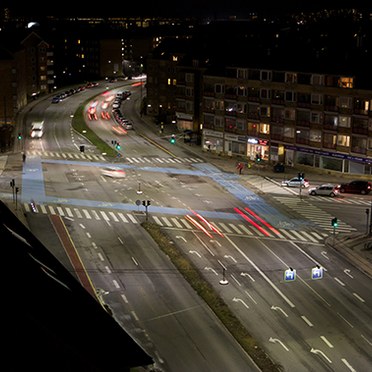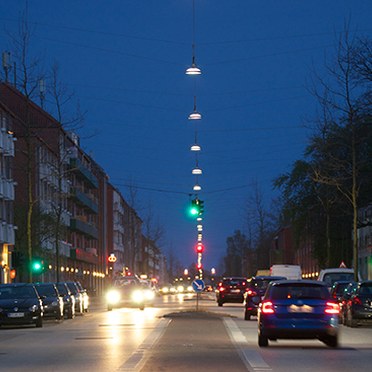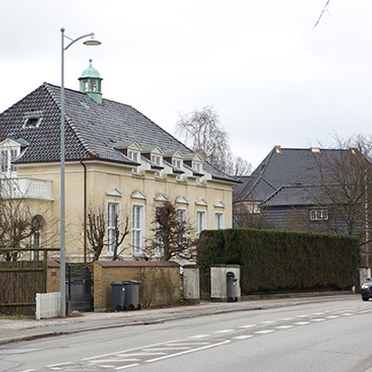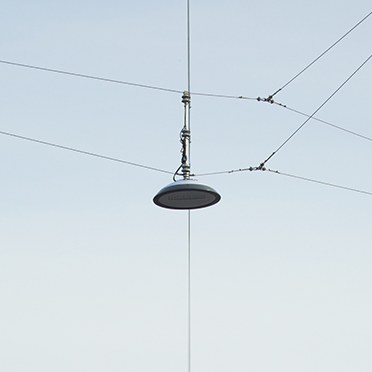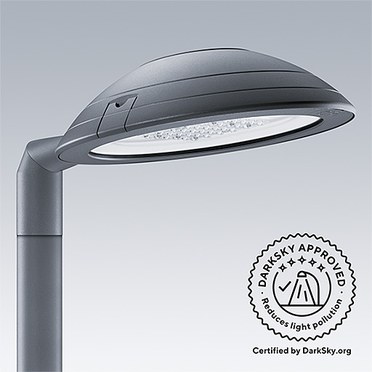Road Lighting Solution for Copenhagen
Products
- Lamp efficacy
Lamp efficacy
Ensuring the lamp efficiently converts electricity into light (lm/W).
- Ballast classification
Ballast classification
Controlling the electricity supply to the lamp (Energy Efficiency Index).
- Luminaire distribution
Luminaire distribution
Controlling light emission using optics which bend and shape the light to the correct location.
- System efficacy
System efficacy
Combining optical and thermal control within the luminaire (luminaire lm/W).
- Presence/absence detection
Presence/absence detection
Presence: Lights automatically turn on/off with movement. Absence: Lights automatically turn off and must be manually switched on.
- Daylight detection
Daylight detection
Artificial lighting which responds to the natural light conditions.
- Constant illuminance
Constant illuminance
A function designed to produce correct light levels for the duration of the maintenance period.
- Task-scene setting
Task-scene setting
Allowing the user to set scenes and adapt the lighting to different tasks.
- Timed off
Timed off
Automatic cut-off can be installed to turn all lights off during unoccupied hours.
- Task lighting
Task lighting
Lighting task areas with the correct amount of light.
- Zoning of lighting
Zoning of lighting
Lighting is zoned according to area use.
- Maintenance schedule
Maintenance schedule
Maintenance must be performed in response to product age, performance and environment.
- Waste light
Waste light
Eliminating waste light which does not hit the intended target.
- Reflectance
Reflectance
Taking advantage of light which is reflected from the surface within the space.
- Visible smart metering
Visible smart metering
Results of actions can be quickly seen as increased or decreased energy use to encourage responsible energy consumption.
The Thor lantern from Thorn offers Scandinavian design and ideal lighting performance for the application. Connected via a wireless lighting control management system, future proof lighting control management can be realized, which is an important aspect for the Smart City.
Background
The City of Copenhagen, Denmark, is one of the world’s smartest and most sustainable cities. Having set an ambitious target to become carbon neutral by 2025, Copenhagen is currently transforming how it manages energy, and is on track to become the first carbon neutral city in the world. Another key requirement for achieving Copenhagen’s carbon neutral target, is a substantial reduction of the energy consumption from the street lighting. To meet this target the almost 20 000 street lanterns with mainly high-pressure sodium lamps needed replacing.
Lighting objectives
The City of Copenhagen’s lighting objectives were as follows:
Replace the high pressure sodium lamps on Copenhagen’s residential roads, larger streets and highways with an efficient custom designed LED lantern
Achieve substantial energy and CO2 savings to help the city achieve its target of being carbon neutral by 2025
Improve the quality of street lighting to increase security and comfort
Integrate lighting control with traffic density data to adapt lighting levels according to road use in the future
Create a central management system for the effective management and control of street lighting
Developing a custom lantern for the City of Copenhagen
The renewal project, which includes intelligent lighting controls too, is managed by Citelum, who won the contract in 2013 when the City of Copenhagen tendered it out. Thorn delivered the customized road lantern Thor for this project. The Thor luminaire meets the specific project requirements, including the mounting options of either catenary or post-top.
Having already designed other successful Thorn luminaires, Thorn appointed Danish lighting designer Morten Lyhne to help realise Copenhagen’s objectives. His design is characterized by simplicity. It combines functionality with aesthetics, and always include a certain intelligence as well. This becomes apparent in the design of the LED road lantern Thor, which he created for Thorn.
With a round, simple design the luminaire continues Copenhagen’s tradition for round lighting fixtures. The luminaire efficacy of 97lm/W fulfils the performance requirements. The polycarbonate top dome can house an additional LED module and as a result provide the specified uplight. This indirect light ensures that the luminaire keeps its shaped appearance, also when it is dark. The dome also provides the smart city requirements, i.e. an antenna and electronics can be mounted inside the fixture.
Approximately 8 500 Thor lanterns mounted in 8m height catenary system as well as 1 500 post-top luminaires in 6m height create the Scandinavian look and feel, and integrate harmoniously into the cityscape. With different colour temperatures to choose from, and distances between the luminaires from 28m to 30m, main roads as well as residential areas, plazas and parks are lit up according to the road standards.
Benefits of the new custom designed Thor lantern
The new Thor lantern, custom designed and developed by Thorn, is providing the following benefits for the City of Copenhagen:
Energy efficient LED lighting (97Llm/W) which reduces energy consumption by up to 60%
Maximised energy savings with light output management through the night. Control options currently include a pre-set schedule and daylight dimming. In the future smart data will be used to adjust light levels automatically to road use
Better quality of light for improved comfort and safety (luminance levels of 0,75 to 1 cd/m2; illuminance levels of 2,5 to 15 lux; various colour temperatures; colour rendering index of 80)
Reliable build, and set for simple maintenance to substantially reduce costs of operation during a very long expected lifetime
Easy to maintain with instant failure/fault alerts to the central management system
Designed to enhance Copenhagen’s distinctive architecture
Connectivity for energy efficiency, monitoring and traffic management
The new Copenhagen road lighting is connected via a wireless control system from SilverSpring Networks, which is based on the “wireless IPv6” protocol and is compatible with the servicing software from Citelum. Based on this, the functionalities of the luminaires can be used for smart lighting management, and as a result for an energy efficient operation as well as a complete monitoring accompanied by planned maintenance intervals. There are preparations in place to control the luminaires based on daylight levels in the future. Another possibility is to connect the lighting with traffic management data and adapt the illuminance – without affecting safety – based on traffic density and the situation on the road. If the traffic density is lower, the luminaires, which have a wet road optic optimised for illuminating wet roads, can be dimmed between 30% and 70%. Beyond that the cycle-friendly transport policy of Copenhagen can be included by introducing optional sensors and camera systems, that can be integrated in the Thor luminaire. Cyclists can be detected, and then guided to what seems to indicate the quietest or fastest route. This shows what possibilities data connectivity and technologies offer today, and how much Copenhagen focuses on creating a Smart City that is beneficial for the citizens.
Focusing on the application – the new Thor L
The experience from the demanding project has been used to create the second generation of Thor, which will be launched at L+B. New from Thorn, Thor L is an intelligent urban lantern based on the City of Copenhagen’s custom designed Thor lantern. Thor L offers a truly connected solution for smart, energy efficient lighting. It can incorporate intelligent wireless control systems and is compatible with various communication devices, including sensors and CCTV cameras. Thor L’s polycarbonate top dome allows components to be mounted inside the dome to meet Smart City requirements.

